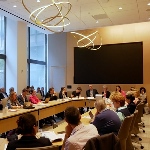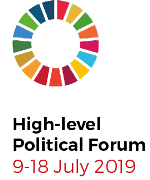Social Watch News
Published on Tue, 2019-07-23 23:39

Photo: Coordinadora ONGD.
|
Every year since the adoption of the 2030 Agenda in 2015, governments are invited to present Voluntary National Reviews (VNRs) on their progress in achieving the Sustainable Development Goals (SDGs) at the High Level Political Forum (HLPF) of the UN. This process is heralded by some as a great opportunity to hold governments accountable to their actions and by others as a beauty contest riddled with misrepresentation and power imbalances. Civil society organizations in many countries produce their own alternative “spotlight reports,” playing with the name of “shadow reports” traditionally given to such independent voices in the Human Rights context.
An event titled “National Reports on 2030 Agenda: What do They (Not) Tell Us?,” jointly hosted by the United Nations Development Program (UNDP), the Committee for Development Policy (CDP), Global Policy Forum (GPF) and Social Watch, explored these tensions and sought to identify opportunities to improve reporting, monitoring, follow-up and accountability in these national review processes.
|
|
Source: 
. Published on Mon, 2019-07-22 00:00
By Margaret O'Dwyer, DC
(With information from the Civil Society Reflection Group on the 2030 Agenda for Sustainable Development)
The High Level Political Forum, which is taking place now through July 18 at UN Headquarters in New York, typically involves countries reporting on their progress in achieving the UN’s 17 Sustainable Development Goals. It is usually civil society, however, which points out the gaps. One means of doing so is through the Spotlight Report, which has just been released. The report calls for stronger commitments in realizing human rights and a shift in how and where power is vested.
|
|
Source: 
. Published on Thu, 2019-07-18 10:15
La ONU advierte que la desigualdad así como las discriminaciones que sufren mujeres, minorías étnicas, el colectivo LGTBI y la población rural impedirán que se logren los Objetivos de Desarrollo Sostenible en 2030.
|
Published on Wed, 2019-07-17 10:37

Photo: FES
|
“There needs to be an examination of the hardware of the 2030 Agenda, rather than an upgrade of its software” concludes the 2019 Spotlight Report launched on Thursday, 11 July during the High Level Political Forum that reviews the United Nations 2030 Agenda for sustainable development. The meeting was co-sponsored by Global Policy Watch, United Nations Research Institute for Social Development (UNRISD) and Friedrich-Ebert-Stiftung (FES). Under the title of “Reshaping governance for sustainability”, the civil society report explores transforming institutions, shifting power and strengthening rights. The launch event showcased the ideas presented by a variety of the report’s authors.
|
Published on Tue, 2019-07-16 13:25
In an event in 10 July 2019, Social Watch Philippines (SWP) led a discussion called, “Conversation on Tobacco Control Initiatives, Impact of 17th Congress Tobacco Tax Increase, and Universal Health Care- Implementing Rules and Regulations” where the SWP Spotlight Report for 2019 on the SDGs entitled “The PH SDG Agenda: Closing Gaps, Overcoming Policy Incoherence” and the Philippine VNR were discussed by SWP Co-Convenor Dr. Maria Victoria Raquiza and the National Economic and Development Authority Usec. Rosemarie G. Edillon, PhD respectively. Three years ago, SWP has also made its statement on SDGs, through its Spotlight Report, on overcoming poverty and achieving sustainable development.
|
|
Source: 
. Published on Tue, 2019-07-16 00:00
Der Nachhaltigkeitsindex der Bertelsmann-Stiftung soll Aufschluss darüber geben, wie einzelne Länder bei der Umsetzung der Agenda 2030 vorankommen. Doch die hohen Kosten des westlichen Entwicklungsmodells gehen dabei unter.
|
Published on Mon, 2019-07-15 11:43
PNGO Network, Social Watch member in Palestine, issued a paper entitled “The Impact of Current Situation on Women Protection in the Gaza Strip”
The paper highlights the effect of the protracted crises in the Gaza Strip on women who become shock-absorbers during crisis. Also, it illustrates the key barriers impede the work of national women organizations to intervene in women protection and addresses the required steps from varies parties to achieve women protection in Gaza.
|
Published on Thu, 2019-07-11 18:45
The 2030 Agenda and the SDGs have also captured the attention of many parts of the UN system, which are slowly restructuring their work plans towards their achievement. This fact can be seen in negotiations on UN development system reform and country-level reporting; on the push for a Data Revolution as well as Information and Technology. The VNRs are being analysed by civil society groups as well as the UN Committee on Development Policy to see the extent to which they are focused on leaving no one behind, and tackling the furthest behind first, as well as the extent to which they address trade-offs between the goals and especially spillover effects from global policies that impede their achievement.
|
Published on Thu, 2019-07-11 18:40
Since 2015, the Civil Society Reflection Group (CSRG) has been monitoring how governments and international organizations have been implementing the SDGs and the 2030 Agenda. In his assessment of progress on SDG 13 – taking urgent action to combat climate change— Indrajit Bose, from the Third World Network, reminds us that Cyclone Idai, which devastated Mozambique, Zimbabwe and Malawi in March is just the most recent example of the catastrophic impacts of climate change on developing countries.
|
Published on Thu, 2019-07-11 12:51
The side event will present and discuss the importance of national reporting on the 2030 Agenda, both by governments (VNRs) and civil society (“spotlight” or “shadow” reports).
The Committee for Development Policy (CDP) will present key findings of its analysis of 2018 VNRs. Voluntary national reviews (VNRs) are an important innovation as a United Nations process for follow-up to the adoption of development agendas, in particular the 2030 Agenda for Sustainable Development and its Sustainable Development Goals (SDGs).
|
SUSCRIBE TO OUR NEWSLETTER
Submit

|












